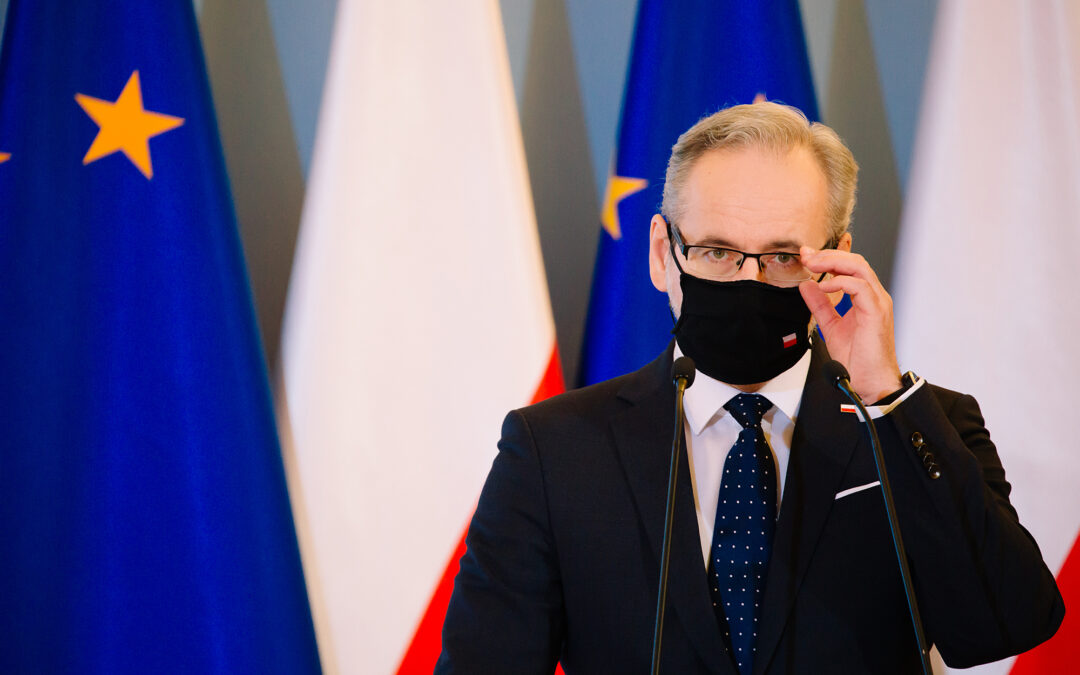Poland will loosen some of its coronavirus restrictions by allowing shopping centres and some cultural institutions to reopen at the start of next week. The government will also abolish special hours set aside for elderly shoppers.
Other current lockdown measures – such as the closure of hotels, restaurants and sports facilities – will, however, remain in place. All but the youngest three year groups in schools will also continue learning from home.
At a press conference on Thursday, health minister Adam Niedzielski justified the partial reopenings by saying that the situation in Poland “seems to have stabilised”. However, he added that the government remains vigilant of “the international situation”, including new mutations of the virus.
After growing growing exponentially in October, coronavirus infections have been in constant decline since November. Death rates, however, have not fallen as far or as fast, and remain at relatively high levels.
From Monday 1 February, shops in malls as well as museums and art galleries will be allowed to reopen under strict sanitary conditions.
Additionally, the requirement that certain shops set aside the hours between 10 am and 12 noon exclusively for people aged over 60 will be dropped from the start of next week. Niedzielski noted that businesses have complained about the rules.
Travel restrictions will remain unchanged, with a 10-day quarantine requirement for all those arriving on organised transport who do not present a negative coronavirus test. The government will re-evaluate the current rules in two weeks at the earliest.
Earlier this week a cross-party conference of leaders discussed the current coronavirus lockdown, which has been in place since mid-October.
Following the call, Niedzielski said that during the “very heated” talks there were divergent opinions, “even within the opposition”. Some had advocated a loosening of restrictions, while others were calling for an extension of the current rules into mid-February.
The government has also faced growing pressure to loosen lockdown from businesses, some of which have recently been opening in defiance of the restrictions, claiming that they are illegal. A body representing gym owners has announced that, regardless of the new rules, they will reopen en masse at the start of February.
For more on the growing number of Polish businesses choosing to reopen in violation of lockdown restrictions, which some claim are illegal, see our recent report https://t.co/sozLm98tfM
— Notes from Poland 🇵🇱 (@notesfrompoland) January 25, 2021
During Thursday’s conference, the health minister noted that other countries around Europe had been extending their strict lockdowns amid growing numbers of cases. He also informed that a second case of the new “British variant” of coronavirus has been confirmed in Poland this week.
Niedzielski said that the country was keeping a “safety buffer” of hospital beds and ventilators. Just under 30,000 beds had been set aside for COVID-19 patients, he noted, but their share will decline in the coming weeks as they are transferred back into the regular healthcare system.
On Wednesday, the government announced that it had administered its one millionth dose of the coronavirus vaccine. The vaccination rollout has, however, been slowed down by Europe-wide delays in delivery of the vaccine.
Poland has now administered over one million doses of coronavirus vaccine.
Its vaccination rate per person is slightly above the EU average, according to @OurWorldInData's figures pic.twitter.com/2Gpx5EP4ge
— Notes from Poland 🇵🇱 (@notesfrompoland) January 28, 2021
Main image credit: Krystian Maj/KPRM (under CC BY-NC-ND 2.0)

Maria Wilczek is deputy editor of Notes from Poland. She is a regular writer for The Times, The Economist and Al Jazeera English, and has also featured in Foreign Policy, Politico Europe, The Spectator and Gazeta Wyborcza.




















